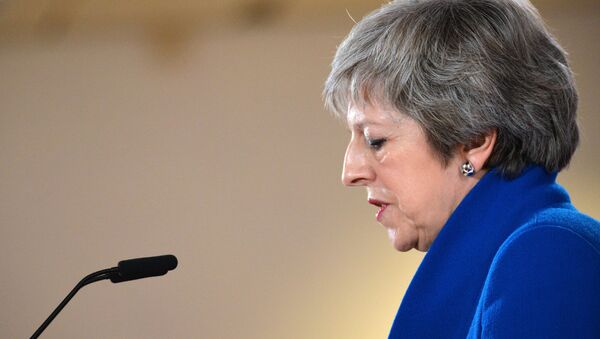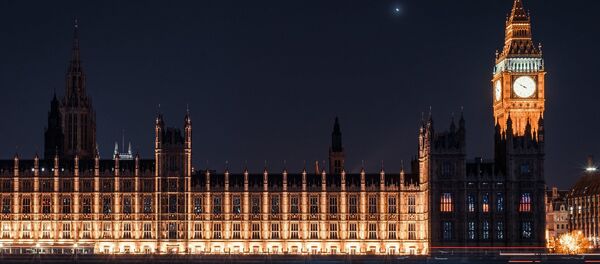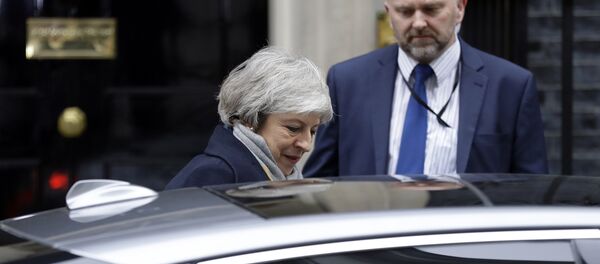Sputnik: Theresa May has not managed to push through her Brexit deal in parliament. What complications will this have on Brexit negotiations?
James F. Downes: Prime Minister Theresa May's Brexit deal has been rejected by 230 votes — the largest defeat for a sitting government in history. MP’s voted by 432 votes to 202 to reject the deal. The defeat for the Prime Minister is not only historical. It is a damning verdict by MP’s on her proposed Brexit deal and has plunged Britain further into political chaos.
READ MORE: No-Deal Brexit Risk is High After Rejection of Withdrawal Agreement — Barnier
The vote will create more complications for the type of Brexit that we are likely to see, with Remainers and Leavers both voting unanimously against the prime minister’s proposed Brexit deal. It is difficult to fully assess both the magnitude and sale of such a defeat. In any normal political situation, a defeat on this scale would cause a prime minister and their government to resign. These are not normal times. The chances of Britain now crashing out with a "no-deal" scenario by 29 March 2019 has also now increased considerably. This would be a nightmare situation for the financial markets.
Sputnik: Theresa May said that the vote showed nothing about what the Parliament supports. In your view, what does the Parliament want for Britain? How can this vote impact the exiting process from the bloc?
James F. Downes: The prime minister’s proposed Brexit deal sought to have a "Soft Brexit". This effectively meant having a gradual departure from the EU on the 29th of March and setting up a long-term transition deal for free trade and a staggered departure from key EU institutions such as the European Court of Justice.
Sputnik: The German Foreign Minister says the EU and UK could have new talks if the deal is voted down. Do you think this statement had some influence on the vote? What chances do you think May has in renegotiating the deal?
The only area where the EU could budge and allow a concession is to provide Britain more time and this could potentially lead to an extension of Article 50 beyond the original date of 29 March 2019. However, this all depends on whether the Prime Minister Theresa May now has the political mandate to remain in office now that a no confidence vote has been tabled against her. I previously stated in an interview with CNBC Asia back in December that Theresa May is still living in fantasy land and I stand by what I said back then. She is still living in a fantasy land and the sheer scale of the Commons defeat further backs this point up.
Sputnik: The opposition leader Jeremy Corbyn tabled a vote of no confidence against May. What political future awaits May?
James F. Downes: This is a very important question. If Jeremy Corbyn is successful in tabling a vote of no confidence vote against May, then a General Election could be held. The no confidence vote will be held at about 19:00 GMT on Wednesday. If May and her government lose the vote, then a General Election could trigger further political uncertainty and also economic uncertainty with the financial markets. If such a situation arose, it is not currently clear if the Conservatives could gain a majority, how well the main opposition party Labour could fare electorally (they are just as split ideologically to the Conservative Party) and how exactly British voters would vote. Once again, we are in completely unprecedented territory and uncharted waters. There is very likely now a real possibility that Brexit will be further delayed and watered down. The future of Brexit and that of Theresa May now depends on the no confidence vote and more uncertainty and political risk lies on the horizon.
READ MORE: UK Will Crash Without Brexit Deal, Parliament Needs to Act — Lecturer
The most worrying implication right now is not what type of Brexit will be implemented, but one of polarization, with greater disconnect increasing between British voters and elected representatives in the future ahead.
Sputnik: What implications for democracy and political trust in Britain will the vote bring?
James F. Downes: The political future of Britain is increasingly uncertain. If a second Referendum was held or Article 50 was revoked, this is likely to further exacerbate polarization within the United Kingdom and further undermine the trust of British citizens in British democracy (both Leavers and Remainers) and overall trust in politicians. My main argument is the same as before, that we should not be worrying about the short-term economic consequences of Brexit, but the long-term political implications for democracy in Britain. Britain is effectively going from being the "United Kingdom" to the "Disunited Kingdom".
This lack of trust amongst citizens could have disastrous implications in the long-term for Britain as a whole and it could take decades for this trust to return and further polarization is likely to set in politically. Similar patterns of electoral volatility and record declines in political trust for mainstream parties can be observed across the European continent lately.
The views and opinions expressed by the speaker do not necessarily reflect those of Sputnik.





